Antonio Vivaldi
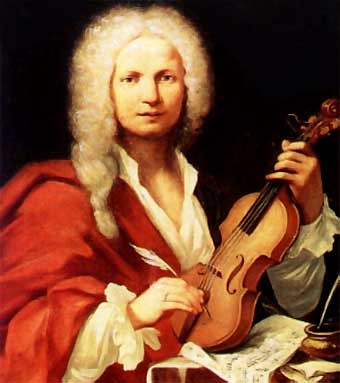
Lived: 1678-1741
Nationality: Italian
Era: Baroque

Lived: 1678-1741
Nationality: Italian
Era: Baroque
For many people, the name Vivaldi is associated with just one piece of music - Ie quattro stagioni (The Four Seasons) - which has been recorded countless times. But many other gems of Vivaldi's output are worth exploring: he was one of the most prolific and influential composers of his time, and without his contribution to the development of concerto form, the instrumental music of later composers such as Bach would have been the poorer.
The Red Priest
Vivaldi was born (during a minor earthquake) in Venice, to a baker turned professional violinist, with whom the young Antonio studied. In 1693 he began to train for the priesthood, while still living at home and continuing his violin studies. He was ordained in 1703, and his startling red hair earned him the nickname of i] prete rosso (the Red Priest), but the ecclesiastical life did not entirely suit him, and several times he found himself at odds with the church authorities. In the year of his ordination, Vivaldi was appointed violin teacher at the Conservatorio dell' Ospedale della Pied, a Venetian orphanage which housed and educated young girls. Music was held in high esteem there, and its reputation was such that many leading performers took part in its concerts. Vivaldi was required to teach and rehearse the students and to maintain the instruments. His initial appointment lasted six years, during which time he published a set of 12 trio sonate da camera and a set of solo violin sonatas. He had already begun to write concertos, which became his favourite medium.
Vivaldi's concertos
In all Vivaldi wrote well over 200 violin concertos, around 27 cello concertos, around a dozen for flute, three for piccolo, 20 for oboe, 37 for bassoon (an instrument for which few other composers have written concertos), and many more double and multiple concertos, of which the E minor concerto for four violins, Op. 3 No.4, is very well known. The fanciful titles of some of his concertos gave Vivaldi plenty of opportunity for descriptive writing. As well as the famous Four Seasons, programmatically depicting seasonal activities such as skating on the ice (winter), hunting (autumn), and listening to birdsong (spring), their titles include La tempesta di mare (Storm at Sea), ramoroso (The Lover), La caccia (The Hunt) and 11 corneto di posta (The Posthorn). A set of 12 concertos for one, two or four solo violins was published in Amsterdam in 1711 under the title r estro armonico, and instantly sold all over Europe (Bach made keyboard transcriptions of five of them). Another set of 12 (La stravasanza) appeared in 1714, and from then on Vivaldi's music was much in demand (the collection containing The Four Seasons was published in 1725). He also wrote around 60 concerti srossi for strings and bass. In 1711 Vivaldi returned to the Pied., where he took the opportunity to write sacred as well as instrumental music. His cheerful Gloria is still much performed today. He was associated with the institution until his death, although his frequent absences were not popular. He also began to write operas (about 45 in all) for various Italian courts and opera houses, including Mantua, Venice and Rome. Several have recently been revived, although interest still tends to be academic.
Fall from grace
Vivaldi spent much of the last two decades of his life on the move. Around 1725 he became involved with his singing pupil, Anna Giraud. The church authorities cannot have been pleased with the whiff of scandal surrounding the "Red Priest" and in 1737 he was censured for unpriestly conduct. In 1741 Vivaldi undertook a mysterious journey to Vienna (perhaps connected with Anna's work as an opera singer). He arrived on 28 June, and a month later he was dead, apparently of unknown causes. His arrogance and egotism had made many enemies, but his posthumous influence was immense.
o0o
Johann Sebastian Bach
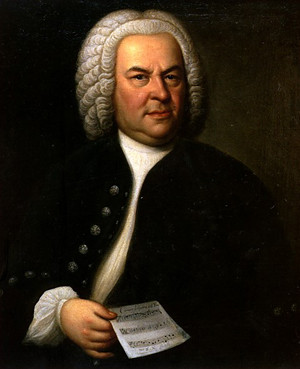
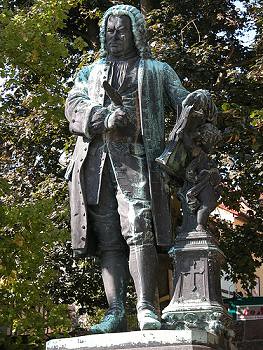
Lived: 1685-1750
Nationality: German
Era: Baroque


Lived: 1685-1750
Nationality: German
Era: Baroque
For many music-lovers, the music of J. S. Bach fulfills a profound spiritual need: it has a timeless, other-worldly quality which could only come from a composer who felt himself close to God. Just as Bach's birthplace was over- shadowed by the Wartburg mountain, topped by the fortress in which Martin Luther hammered out the fundamental principles of Protestant theology, so his life was dominated by his devotion to the Lutheran faith, and his music was dedicated to its service.
Early years
Unlike many of his more cosmopolitan contemporaries, Bach spent his entire career in Germany mostly in the central regions of Thuringia and Saxony. He was born into a long dynasty of Thuringian organists and composers who worked as church organists and choir-masters, municipal musicians, and at the many small princely or ducal courts which flourished in the region. Bach's father, Ambrosius, was himself employed as a musician by the town council of Eisenach, where Johann Sebastian was born on 21 March 1685. After losing both parents by the age of ten, Bach was sent to live at Ohrdruf with his married elder brother, Johann Christoph, who was organist there. It seems likely that Johann Christoph helped with his young brother's musical training, but once Johann Sebastian reached the age of 15, there was no longer room for him in the Ohrdruf household, and he obtained a free place at St Michael's. School in Luneburg, 320km (200 miles) away in north Germany. There he benefited from a solid musical education and sang in the choir, but his formal education came to an end in 1702.
o0o
Joseph Haydn
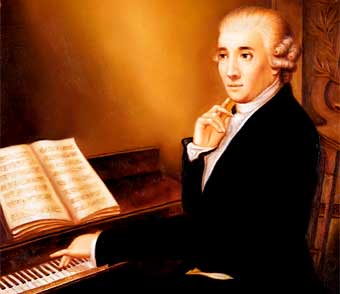
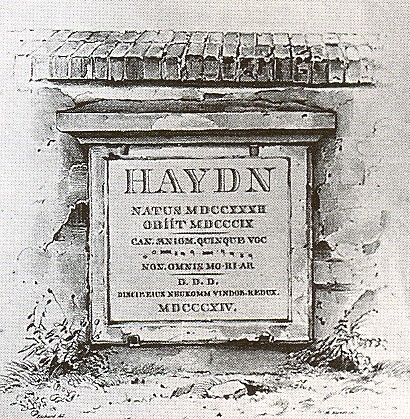
Lived: 1732-1809
Nationality: Austrian
Era: Classical


Lived: 1732-1809
Nationality: Austrian
Era: Classical
Joseph Haydn was the eldest and longest lived of the four great composers of the so-called "First Viennese School". Born when Bach and Handel were at the height of their fame, he outlived his friend Mozart by 18 years, and saw his former pupil Beethoven well established in his own career. It was Haydn who practically invented the Classical musical forms of symphony, concerto, string quartet and sonata. Mozart, Beethoven and Schubert all owed an incalculable debt to their genial, hard-working, predecessor. Haydn's life spanned a period of great social change. He was one of the last major musicians to work for a single aristocratic patron - in his case, the Hungarian Esterhazy family, whose seat was the castle of Eisenstadt, some 80km (SO miles) from Vienna. The arrangement worked quite well for Haydn - his employers treated him fairly - but in their eyes he was no better than a servant. His life-long desire for freedom was granted only towards the end of his long career. when he was effectively pensioned off and was able to travel and enjoy his spreading European reputation.
o0o
Wolfgang Amadeus Mozart
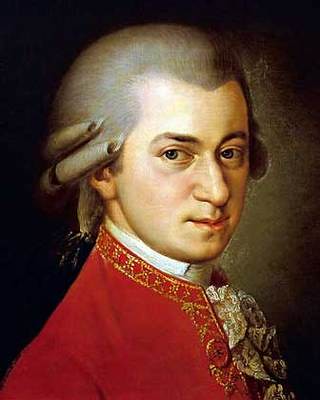
Lived: 1756-1791
Nationality: Austrian
Era: Classical

Lived: 1756-1791
Nationality: Austrian
Era: Classical
The works of Mozart and Beethoven stand at the heart of Western art music. Until the mid 20th century, Beethoven was perhaps the more revered as a heroic figure, battling against personal misfortune to produce his visionary and powerfully original music; while Mozart's music tended to be dismissed as "galant" and superficial. But over the past half-century, the re-evaluation of Mozart, together with the performance and recording of many of his lesser- known works, has revealed a composer of inestimable profundity and infinite variety, whose music has enriched the lives of performers and listeners alike.
Family background
The "miracle whom God let be born in Salzburg" made his appearance on 27 January 1756, the last of seven children born to Leopold Mozart and his wife Anna Maria, and one of only two to survive infancy. Leopold Mozart - a talented violinist, and the author of a successful treatise on violin technique - played in the court orchestra of the Archbishop of Salzburg, one of the most powerful prelates in Austria. Mozart's relationship with his father was central to his life. Leopold Mozart has been vilified as the archetypal domineering father, dragging his prodigiously talented son around the courts of Europe at an early age, not only subjecting him to the rigours of prolonged travel, but forcing him to display his skills on the keyboard to any bored aristocrat who would pay money to listen; then hectoring him when he grew older, trying to obstruct him from leaving a miserable existence in Salzburg for the excitements of Vienna, and interfering in his personal life. In fact, there is no evidence to suggest that Leopold was motivated by anything other than love and solicitude for his son. The Mozart family was very close, and their voluminous correspondence is full of protestations of affection. Leopold's only concern was for Wolfgang's well-being and success. He was one of the few people who fully recognized his son's unique gift, and he took every step to prevent it being squandered.
Childhood
At the age of four, Wolfgang began to study keyboard and composition with his father. Wolfgang's elder sister Maria Anna (Nannerl) was also a talented pianist, though once she reached adulthood, the conventions of the time obliged her to confine her talents to the domestic sphere. Leopold saw it as his duty to exhibit his exceptional children to the world. When they were six and 11 respectively, he took them to perform before the Elector of Bavaria at Munich, and the Empress Maria Theresa in Vienna. In 1763 the whole family undertook a trip to Paris and London, where Wolfgang played to both French and English monarchs. By this time he was already composing: four early keyboard sonatas were published in Paris, and he wrote his first symphonies in London. The family arrived back in Salzburg in November 1766. A further trip to Vienna failed to result in a hoped-for opera commission, but on returning home Mozart wrote one anyway, and La flnta semplice (The Pretend Simpleton) was performed at the Archbishop's palace in May 1769.
Years of travel
In December 1769 Leopold took Wolfgang to Italy for the first time. After visits to Milan, Florence, Rome and Naples, Mozart received his first opera commission. Mitridate, re di ponto was performed at Christmas 1770 at the Milanese court; but although both it and a further opera, Lucio Silla, were well received, Mozart's request for a job was turned down. Back in Salzburg, Mozart settled down reluctantly as Konzertmeister to the court orchestra of a new (and less tolerant) Archbishop, and continued to compose. In January 1775 he and his father travelled together for the last time, to Munich, for the performance of Mozart's comic opera, La finta aiardiniera (The Pretend Gardener). Two years later he asked for another period of leave, for an extended trip to Paris. The Archbishop promptly dismissed him, and Leopold, realizing that his own position was now in jeopardy, decided not to go. Mozart set out with his mother as chaperone. The trip was a disaster. After a prolonged stay in Mannheim, where Wolfgang fell madly in love with a young singer called Aloysia Weber, he was peremptorily ordered by Leopold on to Paris. There he found the sophisticated French capital totally uninterested in an unknown provincial composer, now too old to be interesting as a prodigy. Although the Paris experience did produce some fine works - the Paris Symphony (No. 31) and a concerto for flute and harp (both fashionable French instruments) - there was no financial gain and a severe loss, when Mozart's mother died suddenly. Saddened and disillusioned, Mozart returned home.
Idomeneo
For the next 18 months he buried himself in his official court duties, writing sacred music for the Salzburg court, as well as symphonies, serenades, the Sinfonia Concertante for violin and viola (inspired by the French model) and a double piano concerto for himself and Nannerl. Then, in the summer of 1780, he was commissioned to write a new opera for Munich, on the subject of Idomeneus, king of Crete. Idomeneo is Mozart's first great opera - the first in which he demonstrated his extraordinary talent for bringing characters to life, allowing them to express real human emotions through the medium of music.
Vienna: early years
After being feted in Munich, Mozart felt stifled by the petty humiliations of life in Salzburg. In March 1781 he was summoned to Vienna in the Achbishop's retinue, and took advantage of the rising antagonism between himself and his employer to engineer his own dismissal - albeit "with a box on the ear and a kick on the backside". To Leopold's dismay, Mozart announced his intention of remaining in Vienna, where he would teach, compose, and give concerts. It was a bold idea, but ultimately an unsuccessful one. Austria was at war with the Turkish Empire, money was short, and fashions ephemeral, but for a few years, Mozart's novelty value paid dividends. During his first year in Vienna he composed a group of three new piano concertos to play at his own subscription concerts, three magnificent wind serenades, and a new opera, Die Enifrihruna aus dem Serail (The Abduction from the Seraalio), with a German text and spoken dialogue (a type known as a Sinaspiel). Its success was marred only by the laconic remark of the emperor that it seemed to have "too many notes". Mozart also got married, much against his father's wishes. His bride, Constanze Weber, was the younger sister of his first love, Aloysia, who had turned him down. Constanze was an amateur singer: Mozart described her as "kind-natured...not ugly, but no beauty either". She has often been accused of ruining her husband's life by her bad housekeeping, but the accusation seems to have been unfounded, and the marriage - which produced two surviving sons (four other children died in infancy) - was very happy. When Leopold Mozart finally visited his son in 1785, he was much impressed with Wolfgang's fine apartment and high standard of living.
o0o
Ludwig van Beethoven

Lived: 1770-1827
Nationality: German
Era: Classical

Lived: 1770-1827
Nationality: German
Era: Classical
Mozart died in Vienna in the late autumn of 1791, a victim of the stifling class conventions of the ancien régime. A year later, a 20-year-old named Ludwig van Beethoven arrived in Vienna, keen to make his name as a musician. By this time, the face of European society was changing fast. The French Revolution was in full swing, and Austria - horrified at the treatment meted out to the French monarchs, particularly Queen Marie Antoinette, a former Austrian archduchess - had declared war on France. For more than two decades, Europe would be ripped apart by war. While Mozart's life had remained largely unaffected by international politics, Beethoven's revolutionary artistic vision was shaped by the ideology and volcanic social change of the turbulent times in which he lived.
Early years
Beethoven was born into a musical family. His grandfather had been music director to the Archbishop-Elector of Cologne, and his father was also employed at the electoral court, though in the lowlier position of singer and instrumentalist. As with the Mozart family, the majority of the seven children born to Johann van Beethoven and his wife died in infancy, Three boys survived: Ludwig, born on 16 or 17 December 1770, and two younger brothers, Caspar Carl and Nikolaus. Johann van Beethoven, an alcoholic bully, was determined that his eldest son should follow in the young Mozart's footsteps as a child prodigy, But Johann lacked Leopold Mozart's abilities as a teacher, and forced his son to practice the keyboard constantly at the expense of his general education. From around 1780 Beethoven received more kindly and sympathetic instruction from the court composer and organist Christian Neefe, who organized the publication of his pupil's first compositions - a set of keyboard variations. In 1783 a set of three piano sonatas appeared in print with a dedication to the elector, whose successor appointed Beethoven second court organist the following year, In 1787 Neefe suggested that Beethoven should travel to Vienna to take lessons from Mozart, who was much impressed with the young man's, talent. But Beethoven's trip was curtailed by news of his mother's serious illness: she died of tuberculosis, in the summer of that year, leaving him to cope with his father's violence and alcoholism. At the age of 18 Beethoven assumed responsibility for the family affairs, being granted half his father's court salary as well as his own. He also found an influential patron, Count Ferdinand Waldstein, who persuaded the elector to allow Beethoven leave to study with Haydn in Vienna, The elector agreed, and in 1792 Beethoven arrived in Vienna, the city which became his permanent home.
o0o
Franz Schubert
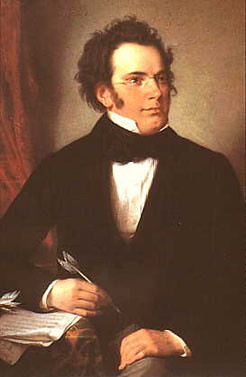
Lived: 1797-1828
Nationality: Austrian
Era: Classical

Lived: 1797-1828
Nationality: Austrian
Era: Classical
On 29 March 1827, Beethoven was buried in the village cemetery of Wiihring, just outside Vienna. Among the torch-bearers in the funeral procession was a dark-haired, bespectacled young man of 30. His name was Franz Schubert, and he was paying homage to the member of his own profession he most revered. Less than two years later, Schubert's own body would be interred in the same cemetery, close to Beethoven's grave. Unlike Beethoven, whose fame during his lifetime had spread all over Europe, Schubert's reputation was largely local. His composing career was short - a mere 15 years - and although he worked in the same genres as his three great predecessors, it was not his operas, or even his symphonies, but his more intimate works, particularly the songs and chamber music, which posthumously ensured his unique place in musical history. By the time war in Europe ended with the Congress of Vienna (1815), European society had changed dramatically. A new generation of middle-class, independently minded citizens had sprung up, but conservative politicians, such as Prince Metternich in Vienna, attempted to maintain the status quo of the ruling classes and banish "subversive and revolutionary tendencies" by keeping the populace firmly under control through censorship and political repression. People sought relief through social activity. Balls and parties became fashionable for the rich, while the less well-off built up a network of like- minded friends, meeting in private homes or at the local coffee houses. This was Schubert's social milieu.
Vienna was the centre of Schubert's universe. He was born on 31 January 1797 to a suburban schoolmaster, who taught all his children to play musical instruments. Franz learned the viola, and together with his father and brothers made up a string quartet. In 1808 he won a scholarship to the imperial seminary, where he had daily music lessons and played in the school orchestra. He also made several formative friendships, one with Joseph von Spaun, an ex-pupil and law student. By the time Schubert left school at the age of 16, he had already written a substantial quantity of music.
o0o
Frederic Chopin
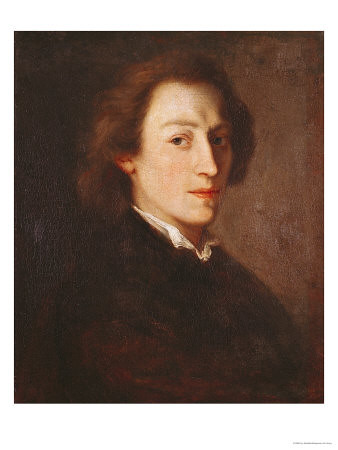
Lived: 1810-1849
Nationality: Polish
Era: Romantic

Lived: 1810-1849
Nationality: Polish
Era: Romantic
Chopin epitomizes the figure of the "Romantic artist": withdrawn, temperamental, talented and doomed to a premature death from tuberculosis. Like Paganini, he was both composer and performer (although his concert-giving was actually very limited), but his music established the piano as the 19th century's most popular instrument. He was also an important figure in the early nationalist movement, drawing inspiration from the folk idioms of his native Poland. Born of mixed French and Polish parentage, Chopin began to compose before he was seven, and made his first public appearances as a pianist. On leaving school at 16 he enrolled at the Warsaw Conservatory, where he began to compose in earnest, and on graduating three years later he decided to seek his fortune abroad. In August 1829 he made his debut in Vienna, playing two of his own piano works, including the set of Variations, Op. 2, whose publication Robert Schumann greeted with the immortal words, "Hats off, gentlemen, a genius!"
o0o
Franz Liszt

Lived: 1811-1886
Nationality: Hungarian
Era: Romantic

Lived: 1811-1886
Nationality: Hungarian
Era: Romantic
As a composer, Liszt tends to stand on the sidelines of music history, partly because he does not fan neatly into the German symphonic tradition, stretching from Beethoven and Schubert, through Schumann and Mendelssohn, to Brahms and Bruckner. But his influence on 19th-century music was enormous: he was a superlative performer (the pianistic equivalent of Paganini), an outstanding teacher, and a dedicated champion of the "music of the future", expressed both in his own innovative and highly individual work, and in his promotion of Wagner. Liszt was the son of an official at the Hungarian court of Haydn's employer, Prince Nikolaus Esterhazy. He showed prodigious talent as a pianist, giving his first piano recital at the age of nine, and Prince Nikolaus funded his education in Vienna, where he moved from an early age in aristocratic circles.
In the 1820s the fIamboyant young virtuoso began to cause a sensation in Paris (where his family moved) and London, where he played for King George IV. Back in Paris in the early 1830s he met Berlioz and Paganini, and made piano transcriptions of some of their works, including Paganini's Caprices, which in liszt's version became the Grande5 etude5 de Paaanini. He was also greatly inlluenced by Chopin's Romantic style. In 1834 he began a liaison with the Countess Marie d'Agoult, which produced three children (their second daughter Cosima later married Wagner). They began a peripatetic existence in Switzerland and Italy, during which time Liszt compiled his Années de pélerinage (Years if Pigrimage) for piano, and the Album d'un voyageur.
o0o
Richard Wagner
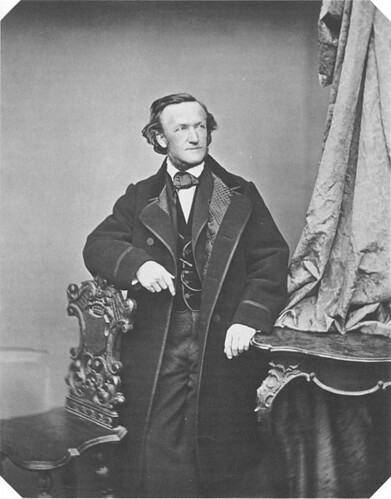
Lived: 1813-1883
Nationality: German
Era: Later Romantics

Lived: 1813-1883
Nationality: German
Era: Later Romantics
The figure of Richard Wagner straddles the 19th century like a colossus. Composer, critic, polemicist, his abundant energy allowed him to a pursue a vision with a ruthless single-mindedness beyond the comprehension of ordinary mortals. His operas, rooted in the German Romantic tradition, remain (like Verdi's) the cornerstones of the modern repertoire, but they require performers of extraordinary power and stamina. There are still few sopranos and tenors able to do justice to roles such as Siegfried, Briinnhilde, Tristan and Isolde, and many singers have burnt out their voices in the attempt.
Friedrich Wagner died of typhus soon after his son Richard was born, and his mother Johanna married Ludwig Meyer, who introduced his stepson to the world of the theatre and music. The family moved to Dresden, where the young Wagner came into contact with Weber, then conductor at the Royal Theatre. According to Wagner, it was Weber who instilled in him "a passion for music". After his stepfather's death the family returned to Wagner's birthplace, Leipzig, where he completed his education at school and university. By now he was passionately interested in the theatre, and in 1832 he began work on his first, abortive, opera. He realized from the start that he would only ever be able to work with his own librettos. He began his theatrical career as a chorus-master in Wiirzburg. It where he completed his first I opera Die Feen (The Fairies). It remained unperformed, but already Wagner was showing a dogged determination to succeed. He began work on a third opera, Das Liebesverbot (Love's Interdict), based on Shakespeare's Measure for Measure, and joined a travelling theatre company as music director. Das Liebesverbot had a single performance in Magdeburg in 1836, before the company went bankrupt.
o0o
Johannes Brahms
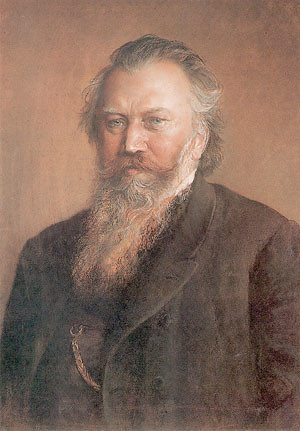
Lived: 1833-1897
Nationality: German
Era: Later Romantics

Lived: 1833-1897
Nationality: German
Era: Later Romantics
One of the greatest symphonic composer of the 19th century, Brahms came from a relatively humble background. His father, Johann Jakob, played the double bass in the Hamburg city orchestra. His mother, who was 17 years older than her husband, came from a middle-class family who had fallen upon hard times: she had been Johann Brahms's housekeeper. Their second child Johannes was born on 7 May 1833.
Early years
Brahms learnt the piano from the age of seven, and from 1846 onwards he also studied composition. In 1848 he gave his first public recital, and that year he also met the Hungarian violinist Eduard Remenyi (1830-98), a refugee from Austrian oppression in his homeland. Five years later Remenyi and Brahms set off on a concert tour, during which they met another Hungarian violinist, Joseph Joachim, and stayed at Weimar with Liszt. Brahms also travelled to Düsseldorf to visit Robert and Clara Schumann, who were both deeply impressed with the pianistic and compositional talents of this "young eagle", as Schumann described him. Shortly after their meeting, Schumann suffered a complete breakdown, and in 1854 Brahms returned to Düsseldorf to help Clara, with whom he fell deeply in love. Their relationship - whether physically consummated or not - was central to Brahms's life, and may have affected his attitude to . other women: though he had close female friends, he never married. During her long widowhood, Clara acted as mentor to the young composer, encouraging him - as she had done with Schumann - to push his art to the limits. In 1857 Brahms spent some months in Detmold, where he tried out his first orchestral works (two serenades) with the court orchestra. Two years later he settled back in Hamburg, where he founded a women's choir and began to write choral music. In the meantime he had completed his First Piano Concerto, begun at the time he met the Schumanns. Brahms himself gave the premiere of this huge work in Hanover, where it met with success; but five days later, in Leipzig, the audience greeted it coolly. By this time Brahms was making himself unpopular by publicly dissociating himself from Liszt and the "New German School". His uncompromising stance probably caused the Leipzig publisher Breitkopf & Härtel to reject his manuscripts, including the Piano Concerto.
o0o
Pyotr Ilyich Tchaikovsky
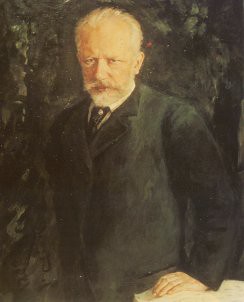
Lived: 1840-1893
Nationality: Russian
Era: Nationalist

Lived: 1840-1893
Nationality: Russian
Era: Nationalist
Tchaikovsky could claim to be the world's most popular "classical" composer. His music has always held a special appeal, for its passion, lyricism, extravagant emotionalism, and glowing orchestral colour. It reflects the extremes of temperament of Its composer - a moody, melancholy character, prone to fits of depression, but also of heightened optimism. Throughout his life, Tchaikovsky was torn between his desire for a "normal" family life, and his homosexual nature. This constant, unhappy struggle was reflected in his music, particularly the later symphonies. Although associated with "The Mighty Handful", Tchaikovsky was never a member of that nationalist group. Much of his own work, however, draws on a rich vein of Russian folk culture, which he successfully fused with the Western symphonic tradition. He wrote: "As far as the Russian element in my music is concerned, this is because I grew up in the provinces, imbued from earliest childhood with the indescribable beauty of the characteristic features of Russian folk music."
Tchaikovsky was the son of a mining engineer, and was born near the Urals. From his delicate, epileptic, French mother he inherited his hypersensitive nature and a tendency to hypochondria. When he was eight, the family moved to St Petersburg, where Tchaikovsky enrolled in the junior department of the School of Jurisprudence, a training-ground for the civil service. By this time, he had acquired twin younger brothers, Anatoly and Modest. He was exceptionally close to his mother, and her shocking death in a cholera epidemic when Tchaikovsky was 14 was a trauma from which he never really recovered
o0o
Gustav Mahler
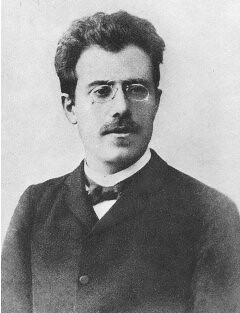
Lived: 1860-1911
Nationality: Austrian
Era: Later Romantics

Lived: 1860-1911
Nationality: Austrian
Era: Later Romantics
Mahler was a transitional figure. A contemporary of Sigmund Freud and the painter Gustav Klimt, his massive orchestral works are rooted in the 19th-century Austro-German symphonic tradition and speak in a rich, late-Romantic idiom inflected with folk idioms, yet look forward to 20th-century preoccupations such as neurosis and mysticism. His most important works are his ten symphonies and his songs with orchestral accompaniment, which influenced them. Four of the symphonies - Nos. 2, 3,4 and 8- have substantial vocal and choral parts, which has tended to limit their performance potential, and for almost five decades after Mahler's death his works were largely neglected, admired only by a small band of devotees, until the advocacy of conductors such as Bruno Walter, Georg Solti and Rafael Kubelik in Europe, Leonard Bernstein in America and Norman del Mar in Britain, restored them to the repertoire.
Mahler was born into a Jewish family and, although he later converted to Catholicism, his career was to some extent blighted by the anti-Semitic attitude of the Austrian establishment. He showed musical promise as a child, and studied at the Vienna Conservatory from 1875-78, where he wrote the cantata Das klagende Lied (The Song of Sorrow). From 1880 onwards he made his living as a conductor at provincial theatres in Upper Austria, Slovenia, Bohemia, and then at Kassel in Germany, where he composed the song-cycle Lieder eines fahrenden Gesellen (Songs of a Wayfarer), and started his First Symphony. In 1885 Mahler spent a year in Prague, and then moved to Leipzig. There he met the Weber family, who introduced him to the folk poetry collection Des Knaben Wunderhorn (The Youth's Maaie Horn, published in 1805-8). From 1887 onwards he began to set some of the Wunderhorn poems, which were reworked in his earlier symphonies.
o0o
Claude Debussy
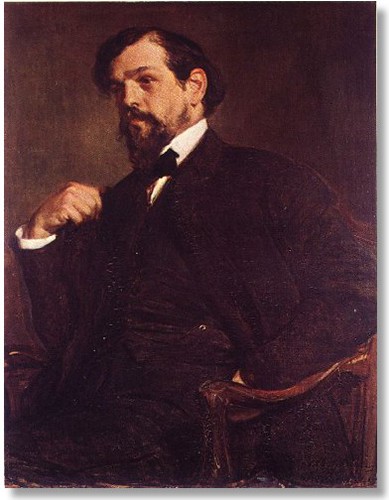
Lived: 1862-1918
Nationality: French
Era: Early 20th Century

Lived: 1862-1918
Nationality: French
Era: Early 20th Century
From the late Baroque period to around 1890, mainstream Western music was firmly rooted in Germany and Austria. Not until the late 19th and early 20th centuries did the line of succession stretching from Bach to Mahler begin to branch out, with major composers emerging from Russia, Bohemia, England, Scandinavia and the USA. It was a Frenchman, Claude Debussy, who broke the German monopoly, revitalizing French music with his uniquely subtle art, and opening up a new sound-world for the 20th century. His music explored "the mysterious relationship between Nature and Imagination". Debussy's life centred on Paris, which was fast becoming the hub of European culture. He was born on 22 August 1862 in the suburb of St Germain-en-Laye, where his parents ran a china shop. The young Claude Achille and his siblings were often packed off to their Aunt Clementine in Cannes, where Debussy began to learn the piano with a former pupil of Chopin. At the age of ten he entered the Paris Conservatoire, where he unnerved his teachers with experimental harmonic improvisations at the keyboard, Despite his unorthodox tendencies, he won the coveted Prix de Rome in 1884 with his cantata L' enfant prodigue, but his sojourn in Rome was not a happy one, and he returned to Paris - where he had been conducting a love affair with a married woman - in the spring of 1887. The same year he became intoxicated with Wagner's music and in 1888 visited Bayreuth, Although Debussy later described Wagner's music as "a beautiful sunset that was mistaken for a dawn", it held a life-long fascination for him, He even began work on a Waguerian opera, but abandoned it when he realized that his own music needed to be "flexible and adaptable to fantasies and dreams".
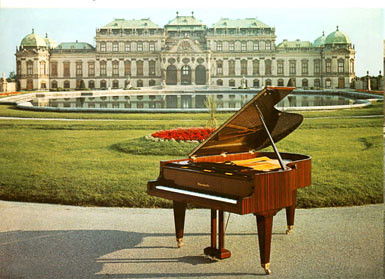
(suu tam)

No comments:
Post a Comment